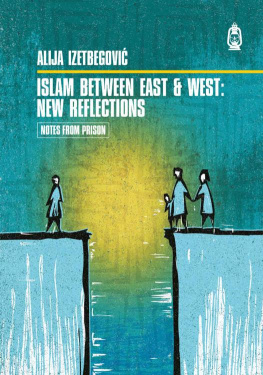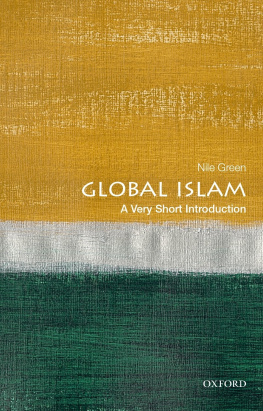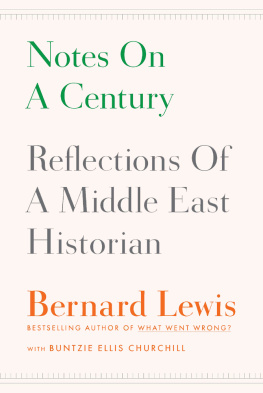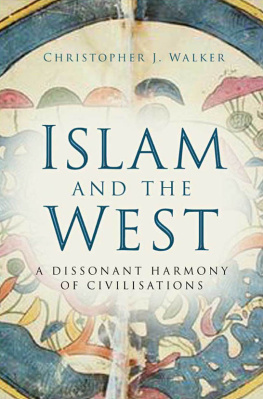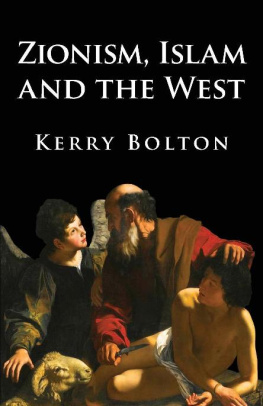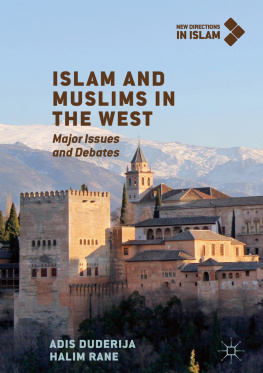1 2 3 4 5 6 7 8 9 10
Claritas Books
Bernard Street, Swansea, United Kingdom
Milpitas, California, United States
Claritas Books 2022
This book is in copyright. Subject to statutory exception and to the provisions of relevant collective licensing agreements, no reproduction of any part may take place without the written permission of Claritas Books.
First Published in May 2022
Typeset in Minion Pro 14/11
Part 5 in the Book Series: Notes From Prison
Islam Between East and West: New Reflections
By Alija Izetbegovi
Revised and edited by Sharif H. Banna
A CIP catalogue record for this book is available from the British Library
ISBN 978-1-905837-93-9
Contents

Foreword
BY SHARIF H.BANNA
When I lose the reasons to live, I shall die. Life has a purpose in itself and on its own. It becomes visible once life has lost all its outer sense: youth, beauty, health, freedom. We then see that the beauty of life is not in these desirable yet impermanent values, but rather in life itself! I have no hatred but I do have bitterness. (Alija Izetbegovi)
Alija Izetbegovi (1925 2003) was a hugely important personality who left a legacy of ideas, leadership and conflict resolution. Dubbed the wise king, he was the first President of Bosnia and Herzegovina. He was an intellectual, a statesman and a leader who guided his nation out of war and destruction. His intellectual depth, ethical integrity and wise leadership are unparalleled among modern world political leaders.
On the occasion of the 25th anniversary of the Srebrenica genocide, where on the 11th of July 1995 and in the days that followed more than 8,000 innocent lives, mainly men and boys, were slaughtered in the bloodiest period of the Bosninan War (1992-1995) and with the rise of racism, xenophobia, anti-Semitism and Islamophobia in many parts of the world, re-connecting with the legacy and works of Alija Izetbegovis life will guide us through lessons of history in resisting hatred and bigotry and pursuing the path of freedom, equality and justice for all. Humans have the potential to do immense good and also have the capacity to unleash much evil and harm. Izetbegovis greatest legacy for me is how a man strove for the dignity and freedom of his people but never lost sight of the ethical and moral imperative. He reminded his nation: We wont seek our future in the past. We wont run after grudge and revenge.
He was an embodiment of the best of the East and the West and sought to carve a middle ground of mutual recognition, co-operation and self-criticism. There was a critical sense of detachment in his methodological approach. In the West, he defended Islam; in Muslim countries, he defended the West. In the West, he was an easterner; in the East, a westerner but in both, he was a Muslim.
His intellectual legacy is of paramount significance for those navigating faith paradigms and religious belief in the modern era. Izetbegovi criticizes the all-encompassing dualism of the human world, exemplified by the insurmountable conflicts between spirit and body, and religion and science. Exploring mans capability to overcome this contradiction, he finds that Islam dictates first the understanding and acceptance of this primeval dualism of the world, and then to overcome it: Islam means the call to create a man harmonious in his soul and body and a society whose laws and socio-political institutions will maintain and not violate this harmony. Izetbegovi argues that Islam is, and should be, a permanent searching through history for a state of inward and outward balance.
Reflecting on Izetbegovis statesmanship, the former leader of the British political party, the Liberal Democrats, Lord Ashdown who was involved in the peace negotiations writes:
I first met Alija Izetbegovi in July 1992. I met him regularly during the war years, frequently in the shell-battered presidency building in Sarajevo. Since May 2002, when I began my work as the International Communitys High Representative for Bosnia-Herzegovina, I have asked him for help as one of the key figures in this countrys fitful reconstruction. That request was never denied. We did not always agree, but I know that he was committed to the peaceful reconstruction of a Bosnia-Herzegovina which could be part of Europe and in which all its citizens could feel at home.
He was tough, scholarly and serious. He lived a simple life and he had little of the opportunistic charm or coarse joviality that are hallmarks of political operators in the Balkans and elsewhere.
Izetbegovi, of all the leaders I dealt with during the war, was a man who conveyed only angst when confronted by the tragedy of conflict in Bosnia-Herzegovina - he was devoid of the cynicism or vanity that marked other war leaders. History will no doubt say that not all his decisions were right, but more than anybody else he was responsible for the fact that Bosnia-Herzegovina survived.
A sense of mission clearly drove Izetbegovi: I would sacrifice peace in order to win sovereignty for Bosnia, he said early in his presidency, but for that peace in Bosnia, I would not sacrifice sovereignty.
Through his ideas, he addressed not only the Muslims in Bosnia and Herzegovina, but across the world. He is the author of several books, most notably Islam Between East and West , Memoirs and My Escape to Freedom , also published as Notes from Prison .
This series entitled Notes from Prison has a special context and story.
When Alija Izetbegovi was imprisoned to serve his fourteen year sentence, he began to keep notes reflections on life and destiny, on religion and politics, on the works he had read and their authors, and on the many other things that came to his mind as he spent some two thousand days and nights in prison. These notes finally amounted to thirteen A5 exercise books of minute, deliberately illegible script, which would be published in late 1999 with the title My Escape to Freedom and also published as Notes from Prison . Izetbegovis notes shed considerable light on his personality, in all its complexity. The notes are deeply philosophical, reflective and universal in value. They provide a glimpse into the extraordinary mind and spirit of Izetbegovi.
Professor Enes Kari, wrote in his review of the book that: It was impossible to read the book without becoming aware of the importance of Alija Izetbegovis intellectual, spiritual and political biography, for these notes, written while serving his prison sentence, fill many gaps in the mosaic that constitutes the intellectual biography of an outstanding figure, one who had a major impact on the final decade of the twentieth century. Kari also observed that Notes from Prison is in fact a refusal to allow the spirit to be quenched, and thus a way in which its author transcended the harsh reality of prison, becoming a quest for human freedom. It is in this blend of the personal and the universal that the importance of Izetbegovis writings is to be found.
This special edition of Notes from Prison is unique in three ways:

